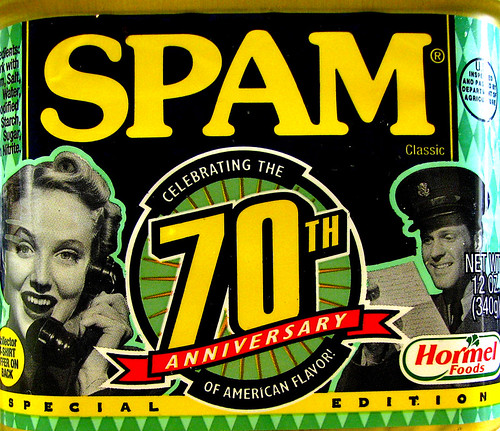___________________________________________________________
I was reading Bohyun Kim's latest blog post this morning, in which she says this:
For a long time, libraries have been banning food and drinks inside the library. For librarians, books and food/drinks were not compatible. For users, they were the same kind of activity. You eat and drink while studying. So libraries eventually came to change the policies. That was a good decision for both libraries and users.
This really brought home to me the fact that libraries enforced a particular point of policy (no food and drink) for probably 99.9% of their history, and have changed it for the most recent 0.1%, and that really it's been fine. The fears that informed the original policy - that the food and drink would damage the books - are sound, but modern publishing methods mean the book isn't such a sacrosanct object anymore, plus (perhaps more importantly) even if some books do get damaged there is an overall gain in user satisfaction because a lot of them have been wanting to bring food and drink in for years. It's a hit worth taking, in other words. Silence is another rule long those lines - libraries are getting noisier, with quiet zones dotted around in many of them, so again it's a rule we've tried to enforce for all but the last 0.1% of library history, and now we're finally changing to suit a new majority of users (in academic libraries particular).
So that got me to thinking, what else are currently trying to hold back, that we will inevitably have to allow in the end - and should we just skip straight to the part where we let it go? If users want to use us in a certain way, should we just let them and be done with it? Of course some people will be upset, but you demonstrably can't please all of the people, all of the time, and we're really not at a stage where we can afford to be elitist in terms of which group of users we satisfy.
I asked twitter what we will be doing in the future but don't do now - here are some of the suggestions:
- Lisa Hutchins said "Smaller borrowing limits for unlimited time periods along lines of DVD rental?" This is one I had in mind, too. Let people have stuff for longer, sanction them less or not at all if they don't bring it back on time. LOVEFiLM and the like are built around the concept of no late fees. You don't send the DVD back, you don't get a new one - but you don't accrue fines either. Could this work in libraries? More to the point, will we eventually have to find a way to make it work in libraries, in which case should we just do it now? . Cons are that people could use the opportunity to effectively steal the books, that books in great demand would be unavailable to people, that libraries would have less money to spend on books if fines are actually a revenue stream for them (even though that isn't their intended purpose). But I can imagine ways round those - you could have a no fines policy that is a bit like mobile phone companies' unlimited use policy, ie there's a little asterisk and it says 'within reasonable limits'. I have 'unlimited' browsing on my iPhone but if I left Google Maps on for a month I'd certainly hear about it from Orange, and get charged. You could move the more popular books into a 'high demand' section which ran along more traditional lines, e.g with 2 week borrowing limits and fines - but put the majority of the collection in the LOVEFiLM model. . Would that work? The big pro would be: people would find libraries more accessible, approachable, and usable. They'd be attracted by the relaxing of the rules.Lisa also pointed out that you couldn't return books to other library branches back in the day, but you often can now. This is exactly the kind of thing I'm talking about - we resisted that change for years, with very good supporting arguments against it I'm sure, but now we've been forced to make it work and we have. .
- Sarah Maule suggested: "opening hours changing dramatically? i.e. open on a sunday being normal?" I can completely see this becoming the norm in thriving libraries, and the reverse being true of struggling ones. I can see in 5 or 10 years time that many libraries will be run by volunteers and will only open 3 afternoons a week, while the bigger ones with more traffic will open long hours 7 days a week (and academic libraries will open 24hrs as a matter of course). Obviously it costs more to staff and open libraries longer, but the counter to this would be that - again - they become more friendly, accessible, and usable, thus making them more likely to become part of people's daily lives, thus getting more use, thus being of more value and so worth funding. .
- Rachel P pointed out: "Mobile phones/devices will be (even more) heavily used (we still ban talking on them here, but in theory only...)" Yes, let's skip to the end of this one, too. We're going to allow them. Mobile phones will be the devices from which humans basically run their lives before the decade is out - banning them will be completely out of the question. The majority of their use won't be for talking on anyway. Just allow them, and tell people to go into stairwells and otherwise talk on them responsibly and with courtesy to others. .
- LibraryWeb said: "can only speculate - but think frontline staff will become much more highly skilled - not just a shelving job nowadays" and added "you should be able to ask any manager (& also the odd talented lib assistant :) the same question and get an answer" I completely agree with this - it doesn't seem to such an issue in public libraries (although I may be wrong) but in academic libraries there's a real culture of passing the customer from desk to desk - oh, you can't do that here / I can't help you with that, you need to go and speak to X or ask at Y. We need to be able to just answer stuff and help people. Would love to skip to the end with that one. .
- Mylee Joseph speculated that we'd offer "musical performances, tai chi classes before opening, cooking demonstrations, DIY broadcasting" This feeds into the whole idea of the library as an evolving space, offering things to the community which the community will value, irrespective if they fall under the 'literacy' umbrella that is our primary purpose. I think mission creep can be a great thing in libraries! .
Any more you can think of?
- thewikiman












